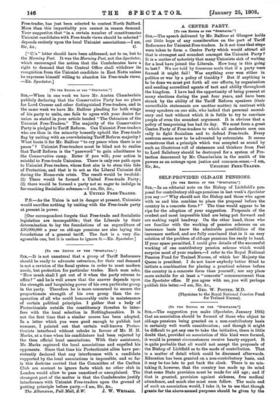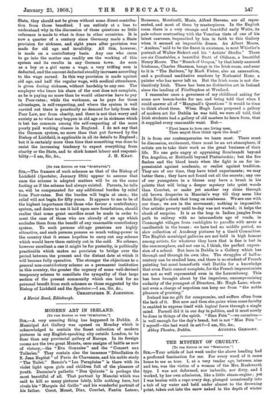[TO THE EDITOR. OF THE " SP ECM ATOR.1
Sin,—The suggestion you make (Spectator, January 18th) that an association should be formed of those who object to old-age pensions being granted on a non-contributory basis is certainly well worth consideration ; and though it might be difficult to get any one to take the initiative, there is little doubt that, provided an association of this kind were formed, it would in present circumstances receive hearty support. It is quite probable that all would not accept the proposals of the Bishop of Lichfield as to the mode of contribution. That is a matter of detail which could be discussed afterwards. Education has been granted on a non-contributory basis, and it may be too late to put back the clock. There is no mis- taking it, however, that the country has made up its mind that some State provision must be made for old age; and if that is granted, provision against sickness, free medical attendance, and much else must soon follow. The main end of such an association would, I take it, be to see that though grants for the above-named purposes should be given by the State, they should not be given without some direct contribu- tion from those benefited. I am entirely at a loss to understand why in the discussion of these questions so little reference is made to what is done in other countries. It is now a quarter of a century since Germany made a State provision for sickness, and eight years after provision was made for old age and invalidity. All this, however, is made on a contributory basis. Any one who cares to go into the matter can readily see the working of this system and its results in any German town. As soon as a boy or a girl earns a wage, a very trifling sum is deducted, and the amount deducted steadily increases according to the wage earned. In this way provision is made against old age, and half the regular wage, with medical attendance, is given during sickness, without hardship to any one. The employer who bears his share of the cost does not complain, as he is paying no more than he would otherwise have to pay in Poor-rates ; while the workman, as he pays for these advantages, is self-respecting, and where the system is well carried out there is practically no demand for help from the Poor Law, nor from charity, and there is not that worry and anxiety as to what may happen in old age or in sickness which is but too common among the self-respecting of the more poorly paid working classes in England. I do not say that the German system, no more than that put forward by the Bishop of Lichfield, is applicable in all its details to England ; but it is certainly more than time that something was done to resist the increasing tendency to expect everything from charity or the State, and to shirk honest labour and responsi-





















































 Previous page
Previous page